While reading this topic, think about the following questions and how they relate to your organisation, community or nation: What’s the difference between a policy, process and procedure Why are they import...
KJ is a Martu organisation working with Martu to build strong and sustainable communities. This is achieved through a comprehensive suite of programs designed to deliver substantial social, cultural, environmental and economic benefits to Martu.
KJ was created by Martu to work, strengthen and sustain their communities.
Newman, Western Australia, Martu Country
Western Australia
Cultural programs; Country programs and land management; community services; early childhood education; leadership; social services.
- Not-for-profit
- Company limited by guarantee
- Incorporated under ASIC
- Highly Commended (2016) Category A: outstanding example of Indigenous Governance in an Indigenous incorporated organisation
Most recent update – December 2024.
About
Kanyirninpa Jukurrpa (KJ) was born from the vision of Martu Elders, who sought to preserve their culture, strengthen connections to Country, and ensure a sustainable future for their people. This vision was brought to life through the efforts of its co-founders, including Muuki Taylor, a Pujiman and senior law man. Muuki holds a wealth of knowledge about Martu law, songs and customs, Country and Martu family histories.
Today Muuki works as Senior Cultural Advisor and co-patron for KJ, providing invaluable cultural advice that guides KJ’s goals and aspirations:
“Martu are strong. Martu have the knowledge. With KJ, Martu are looking after their country the right way. We should keep going. When the old people are finished, the young people must keep going, looking after country. All the future generations should be working to look after country, burning the right way, looking after rock wallabies and digging out waterholes.”
– Muuki Taylor, Senior Cultural Advisor1Kanyirninpa Jukurrpa (KJ), About KJ, accessed November 2024, [link]
Established in 2005 and incorporated as a separate not-for-profit charity in 2009, KJ works alongside Martu to build strong, sustainable communities. Its mission is guided by three core objectives:
- Support Martu to look after culture and Country.
- Build a sustainable economy in the Martu communities.
- Build pathways for young Martu to a healthy future.
Related topic:
About Martu
Traditionally, many Martu were born and raised in the desert and led independent lives. During the 1950s and 1960s, they were taken to missions, carrying with them a wealth of social, cultural, spiritual and environmental knowledge, as well as a distinct rich language unique to the Western Desert. This group is known as the Pujiman.
While Martu identify as one people, their vast lands are home to distinct remote communities with different histories, language and family groups and infrastructures. Martu include people from the traditional language groups of Manyjilyjarra, Kartujarra, Putijarra, Warnman, Nyangajarra and Pijakarli.
Martu Country extends from the Percival Lakes in the north to the southern regions of Lake Disappointment, and stretches eastward beyond the Canning Stock Route, reaching towards the borders of Western Australia and the Northern Territory. Martu had their identity and rights to their Country formally acknowledged in 2002, when they were awarded native title rights for over 13.6 million hectares in the Western Desert.2Kanyirninpa Jukurrpa (KJ), Meet the Martu, accessed November 2024, [link]
Martu values
KJ is guided by eight organisational values, developed in collaboration with Martu to reflect their cultural principles and shared vision for the organisation. These values were revisited in 2021, providing an opportunity for Martu to evaluate how KJ embodies these principles and to ensure the organisation continues working in the right way to support Martu.3 Kanyirninpa Jukurrpa (KJ), Our impact, accessed November 2024, [link]
During this process, Martu affirmed the relevance of the original seven values while introducing walyja (family) to emphasise unity and collaboration. They also replaced “realism” with minyirrpa (being serious) to highlight the importance of taking meaningful action to create a better future, rather than merely talking about change.
Each value begins with a word in Martu language. While these words do not have direct translation into English, they reflect the importance of Martu values in guiding KJ’s work:
Walyja – Family: People working together and identifying personally with this work as one would with family.
Ngaparrji-Ngaparrji – Respect: Martu and non-Martu can work strongly together if they respect each other and act with respect towards each other.
Minyirrpa – Being serious: Taking matters seriously, ‘not playing games’ and being ‘real about it’.
Yiltanyju – Honesty: Talking to and dealing straight with each other, Government and others.
Kujungka – Partnership: Martu and non-Martu working together as equals, with complementary skills and knowledge.
Warrkamu – Participation: By building a culture of participation in Martu communities, individual Martu will be supported and strengthened.
Yiwarra – Building: Creating the future that Martu people want, that strengthens Martu society and engages confidently and effectively with mainstream society.
Nyakuma nintirri – Reflection: Combining action with reflection, to learn as we go.
Martu expressed strong support for KJ’s dedication to cultural respect, genuine partnership, and meaningful action. Their feedback affirms KJ’s role as a trusted partner and underscores the importance of continuous reflection, adaptability, and collaboration to overcome challenges and work towards a stronger, more sustainable future.
Community inclusion in the board room
KJ’s governance structure is unique, reflecting its commitment to shared leadership and community-driven decision-making. KJ’s board of directors ensure equitable representation from all four Martu communities along with Martu living off-Country in nearby towns. The board consists of twelve Martu directors and three non-voting advisory directors. Each Martu community is represented by two directors, with a further four representing the Martu who live in Newman and off-Country in nearby towns.
Directors are nominated at a community event and are elected for two-year terms with positions verified at their annual general meeting. This approach ensures the community has a direct say in selecting representatives who reflect their values and priorities. New directors are briefed on the board’s charter and code of conduct during their induction, allowing them to understand their responsibilities and align with the organisation’s governance framework.
Cultural leadership and support
KJ’s board invites Elders and long serving directors, known as KJ’s Cultural Advisors, to participate in board meetings. These advisors provide cultural and Martu political guidance to the board. Their involvement fosters a supportive and collaborative leadership environment that honours cultural wisdom and expertise.
Board meetings are held in rotation across each community and nearby towns where Martu live throughout the year. To encourage shared leadership, the role of the chairperson rotates among directors, with the role typically assigned to a director from the community hosting the board meeting. This approach enables Martu to build confidence and develop leadership skills.
Inclusive and flexible decision-making
KJ places a strong emphasis on community engagement. Board meetings are open to all Martu community members, fostering transparency and keeping everyone informed about KJ’s activities.
Meetings are held over two days, allowing sufficient time for unpacking and discussing complex topics, allowing directors to make well-informed decisions. If additional time is needed, decisions can be deferred to the next meeting. To enhance understanding and engagement, tools such as graphs, diagrams, and whiteboards are routinely utilised.4 Zan King, Executive Director External Affairs, interviewed by Ana Maria Parada and Tahu Stanley, Australian Indigenous Governance Institute, online, October 16, 2024.
Collaborative leadership structure
KJ’s governance structure operates without a Chief Executive Officer. Instead, three general managers report directly to the board. This decentralised model reinforces collaboration and ensures decisions remain closely aligned with Martu values, priorities, and collective input.
Kujungka (Partnerships)
KJ champions a partnership model shaped by the Martu cultural value of Kujungka which emphasises collaboration between Martu and non-Martu as equals. This approach harnesses the complementary skills and knowledge of both groups, fostering a shared commitment to addressing the needs of Martu communities effectively.5 Zan King, Executive Director External Affairs, interviewed by Ana Maria Parada and Tahu Stanley, Australian Indigenous Governance Institute, online, October 16, 2024.
Building genuine intercultural partnerships is central to KJ’s philosophy. The organisation emphasises mutual respect, understanding, and a willingness to learn from one another.6Kujungkarrini: How to Achieve Aboriginal Policy Objectives: A study of the Martu Leadership Program as an example of putting policy objectives into practice (Social Ventures Australia Limited (SVA Consulting): 2024). One key initiative is the on-Country cultural immersion camps, where participants such as the local Magistrate, the Commissioner of WA Police, Aboriginal Legal Service representatives, and other senior police and justice staff are invited to spend time with Martu. These immersive experiences allow non-Martu to deepen their understanding of Martu culture, people and aspirations, as well as build meaningful and lasting relationships.
“This is the first time I can truly say this immersive experience over five days, you cannot help but grasp, taste, feel, and learn much more about Aboriginal culture…but to be alongside some of the Martu people and Elders who have walked in off the desert in my life time and sit and listen to their wisdom and their willingness and yearning to improve the lives of Martu people, is such a rich experience.”
– Chris Dawson, then Commissioner of WA Police (2018)7Kujungkarrini: How to Achieve Aboriginal Policy Objectives: A study of the Martu Leadership Program as an example of putting policy objectives into practice (Social Ventures Australia Limited (SVA Consulting): 2024), 22.
Related topic:
Martu Leadership Program
KJ is dedicated to enhancing leadership opportunities and fostering confidence among Martu, empowering them to speak up for their communities. In 2014, KJ established the Martu Leadership Program (MLP), an adult community education and development initiative aimed at facilitating strong and effective collaborations between Martu and non-Martu stakeholders, including government, corporations, and institutions.
The MLP serves as a springboard for transformative change, laying the foundation for Martu-led, culturally grounded initiatives. It has cultivated meaningful partnerships with government and non-government partners that enable Martu to engage with non-Indigenous systems in ways that bridge cultural divides and devise innovative solutions to critical issues impacting their communities. It provides platforms for Martu to influence policy and service delivery, ensuring their voices are heard and their needs addressed.8 Kanyirninpa Jukurrpa (KJ), Annual Report 2023-2024, [link]
Martu aged between 18 and 40 are invited to participate in the program, where they develop leadership skills and build confidence through activities which include camps, workshops off-Country, meetings with government and other non-government agencies, and public speaking opportunities.9 Kanyirninpa Jukurrpa (KJ), Annual Report 2023-2024, 42, [link]
Kujungkarrini (building partnerships/working together) is a cornerstone of the Martu Leadership Program (MLP), fostering open and culturally informed relationships between Martu and non-Martu. These partnerships have proven instrumental in designing impactful programs that tackle complex social issues. They highlight the importance of authentic collaboration and holistic Aboriginal-led initiatives.
Key features of the MLP partnerships include:
- Programs that are Martu-led and deeply rooted in cultural values.
- Integrated approaches that work across multiple agencies and portfolios.
- Shared control, governance, and decision-making with Martu at the centre.
- Continuous learning and adaptation between Martu and non-Martu throughout program design and implementation.
- A willingness from both Martu and non-Martu to embrace innovation, including navigating the discomfort that can accompany new ideas.
The MLP is more than a leadership program; it is a catalyst for Martu aspirations, driving culturally relevant, community-led solutions that address critical social challenges while reinforcing traditional authority structures.
By empowering Martu and fostering genuine partnerships, the MLP has transformed how communities and stakeholders collaborate. Its success underscores the power of grassroots leadership to inspire systemic change, promote innovation, and ensure that the future reflects the aspirations of those it impacts most deeply.
Women’s Leadership Program
Established in 2016, the Women’s Leadership Program (WLP) was created to provide Martu women with a safe, supportive platform to address critical issues affecting their communities. This initiative empowers women to take on leadership roles and advocate for meaningful change, both within their communities and in collaboration with external stakeholders. The WLP brings Martu women together to discuss and tackle pressing issues, including family violence, alcohol consumption, the well-being of children, and youth delinquency. By fostering open dialogue and collective action, the program empowers women to create solutions that reflect the needs and values of their communities.10 Kanyirninpa Jukurrpa (KJ), Annual Report 2023-2024, [link]
Martu women in the program actively engage with key stakeholders, such as Perth Children’s Hospital, the National Indigenous Australians Agency (NIAA), and Banksia Juvenile Detention Centre. Through discussions, presentations, and advocacy sessions, they ensure that Martu voices are heard and that policies and services are better tailored to community needs.
A significant achievement of the program is the creation of the Wangka Minyirrpa panel, which provides cultural recommendations to the Court and the Prisoner Review Board. This panel plays a vital role in judicial decision-making, particularly on issues such as family violence and the unique needs of women prisoners. It ensures that cultural perspectives are integral to decisions affecting Martu families.
The WLP promotes collaboration with other First Nations organisations. Program representatives have travelled to Alice Springs and other locations to share experiences and explore solutions for improving community well-being and safety. This has fostered a strong sense of unity and solidarity among participants.
The Women’s Leadership Program is closely aligned with the Women and Families Program, creating a seamless framework for Martu women to engage in leadership and family-oriented activities. Women participating in the program are contracted on a casual basis, offering flexibility to balance their leadership roles with other commitments. Participants are also encouraged to join other KJ initiatives, such as the Ranger and Families programs, further enriching their leadership journey.
“Working together it’s been hard as a young mum but now all working together as a team to make it better for Martu and we need your help.”
– Martu Women11Kanyirninpa Jukurrpa (KJ), Annual Report 2023-2024, 39
Related topic:
Young Guns
The Young Guns program focuses on empowering Martu youth aged 18 to 25. Designed as part of the Martu Leadership Program (MLP), Young Guns equips young people with the skills, confidence, and opportunities needed to step into leadership roles and positively impact their communities.
The program emphasises hands-on learning, where participants gain practical skills such as cooking, navigation, and camp setup. By engaging in these activities, they not only build their own capabilities but also serve as role models for younger Martu, inspiring them to make positive life choices and develop resilience. This approach creates a sustainable cycle of leadership, with each generation learning from and teaching the next.
Participants not only learn from their Elders but also take on responsibility in various programs. Young guns are central to KJ’s youth-focused initiatives, including KJ’s Prison Program and Jijiku Yiwarra (Martu youth diversionary program). These programs aim to help move kids out of unsafe situations and avoid interactions with the criminal justice system.12 Kujungkarrini: How to Achieve Aboriginal Policy Objectives: A study of the Martu Leadership Program as an example of putting policy objectives into practice (Social Ventures Australia Limited (SVA Consulting): 2024).
The Young Guns program goes beyond individual development. It reinforces the social fabric of Martu communities by fostering intergenerational collaboration and culturally grounded leadership. Participants not only learn from Elders but also actively contribute to their communities, ensuring the preservation of Martu knowledge and values while addressing contemporary challenges.
Wama Wangka
One initiative that has sprung from the MLP is Wama Wangka, a transformative Martu-led initiative addressing critical social challenges such as alcohol and substance abuse, violence, depression, suicide, and other self-harming behaviours. Designed with a distinctly Martu approach, the program prioritises cultural education and reconnection with Country as powerful tools to counter these issues, distinguishing itself from conventional non-Indigenous intervention strategies.
Rather than focusing solely on the physical and social dangers of substance abuse, Wama Wangka harnesses Martu cultural values, knowledge, and practices to create a new narrative around becoming a strong Martu adult in a modern context. By reconnecting participants with Country and cultural identity, the program nurtures a sense of purpose, worth, and resilience. This approach fosters a positive and alcohol-free environment, grounding participants in their cultural heritage while addressing contemporary challenges.
Cultural Data Management: preserving and sharing Martu knowledge
KJ is committed to safeguarding the rich cultural heritage of the Martu people and ensuring its accessibility for current and future generations. Through the Pukunyju-laju Kanyirni program (We are Keeping it Safe- Cultural Data Management), KJ carefully manages a wealth of cultural records, including oral histories, genealogies, photographs, and films.13Kanyirninpa Jukurrpa (KJ), Annual Report 2023-2024, 18, [link]
These records span both historical and contemporary contexts, capturing the ongoing activities of KJ teams in the field. One key initiative, the Julyjujanu Wangkakaja (Stories from the Past: Oral History Collection) captures the rich cultural knowledge held by Martu Elders and other knowledge holders. These recordings encompass Martu genealogies, Country ownership, language and bush foods.14Kanyirninpa Jukurrpa (KJ), Annual Report 2023-2024, 17, [link] An important component of the program involves young people recording stories with the guidance and support of the Elders. Elders provide explicit instructions over who can access the stories, and in some cases what activities are permissible on certain areas of Country, ensuring this knowledge is preserved for future generations. This intergenerational approach fosters pride and confidence in the youth while maintaining and sharing cultural knowledge and obligations.
Martu can access these records through the Community Access Library (CAL) with computers located in each Martu community, as well as Newman, Port Hedland, Bidyadanga and Roebourne Regional Prison.15Zan King, Executive Director External Affairs, interviewed by Ana Maria Parada and Tahu Stanley, Australian Indigenous Governance Institute, online, October 16, 2024. Martu can also request copies of materials at any time from the cultural data team. Maintaining full access and ownership of their cultural materials is important for Martu. KJ ensures that decisions regarding the collection, storage and access of these materials are made with Martu guidance. When external parties request access to data, the decision is reviewed in consultation with the family whose information is involved and the KJ Board.
KJ is also undertaking the digital repatriation of significant historical Martu collections. The Cultural Data Management team has engaged in partnerships with institutions such as the State Library of Western Australia to access valuable collections. Over the years the organisation has supported Martu in visiting various institutions such as the Australian Institute of Aboriginal and Torres Strait Islander Studies (AIATSIS), the National Film And Sound Archive (NFSA), and the WA Museum where they have accessed the archives and connected back to their data held off Country.16Kanyirninpa Jukurrpa (KJ), Annual Report 2023-2024, 20, [link]
References
- Kanyirninpa Jukurrpa (KJ), About KJ, accessed November 2024. [link]
- Kanyirninpa Jukurrpa (KJ), Meet the Martu, accessed November 2024. [link]
- Kanyirninpa Jukurrpa (KJ), Our values, accessed November 2024. [link]
- Kujungkarrini: How to Achieve Aboriginal Policy Objectives: A study of the Martu Leadership Program as an example of putting policy objectives into practice (Social Ventures Australia Limited (SVA Consulting): 2024).
- Zan King, Executive Director External Affairs, interviewed by Ana Maria Parada and Tahu Stanley, Australian Indigenous Governance Institute, online, October 16, 2024.
- [1]Kanyirninpa Jukurrpa (KJ), About KJ, accessed November 2024, [link]
- [2]Kanyirninpa Jukurrpa (KJ), Meet the Martu, accessed November 2024, [link]
- [3]Kanyirninpa Jukurrpa (KJ), Our impact, accessed November 2024, [link]
- [4]Zan King, Executive Director External Affairs, interviewed by Ana Maria Parada and Tahu Stanley, Australian Indigenous Governance Institute, online, October 16, 2024.
- [5]Zan King, Executive Director External Affairs, interviewed by Ana Maria Parada and Tahu Stanley, Australian Indigenous Governance Institute, online, October 16, 2024.
- [6]Kujungkarrini: How to Achieve Aboriginal Policy Objectives: A study of the Martu Leadership Program as an example of putting policy objectives into practice (Social Ventures Australia Limited (SVA Consulting): 2024).
- [7]Kujungkarrini: How to Achieve Aboriginal Policy Objectives: A study of the Martu Leadership Program as an example of putting policy objectives into practice (Social Ventures Australia Limited (SVA Consulting): 2024), 22.
- [8]Kanyirninpa Jukurrpa (KJ), Annual Report 2023-2024, [link]
- [9]Kanyirninpa Jukurrpa (KJ), Annual Report 2023-2024, 42, [link]
- [10]Kanyirninpa Jukurrpa (KJ), Annual Report 2023-2024, [link]
- [11]Kanyirninpa Jukurrpa (KJ), Annual Report 2023-2024, 39
- [12]Kujungkarrini: How to Achieve Aboriginal Policy Objectives: A study of the Martu Leadership Program as an example of putting policy objectives into practice (Social Ventures Australia Limited (SVA Consulting): 2024).
- [13]Kanyirninpa Jukurrpa (KJ), Annual Report 2023-2024, 18, [link]
- [14]Kanyirninpa Jukurrpa (KJ), Annual Report 2023-2024, 17, [link]
- [15]Zan King, Executive Director External Affairs, interviewed by Ana Maria Parada and Tahu Stanley, Australian Indigenous Governance Institute, online, October 16, 2024.
- [16]Kanyirninpa Jukurrpa (KJ), Annual Report 2023-2024, 20, [link]
Stay connected
Subscribe to AIGI news and updates.


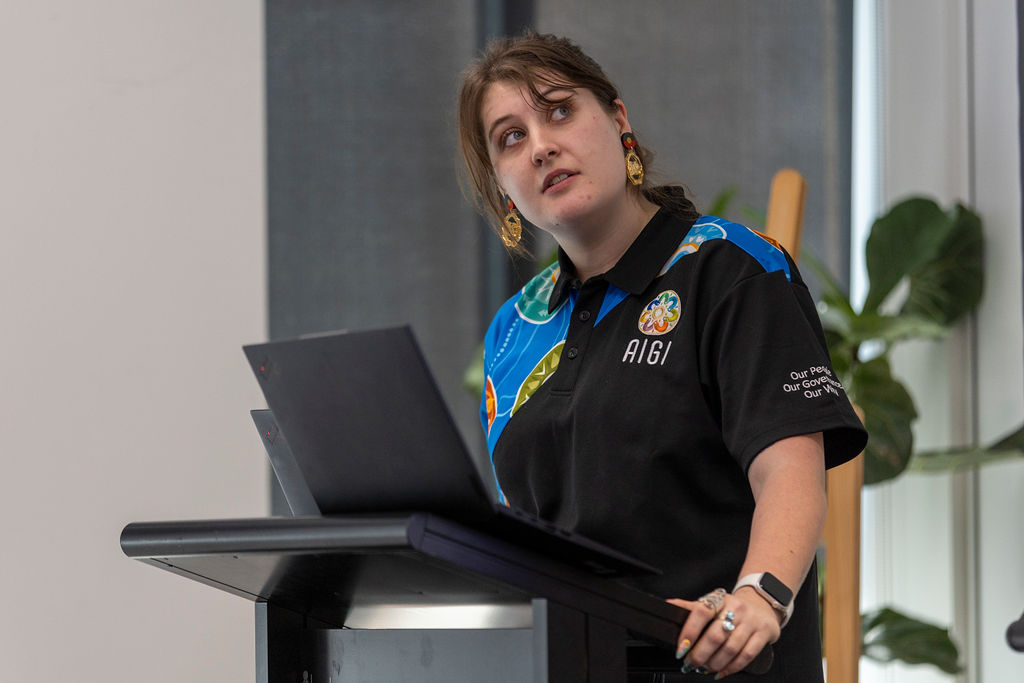
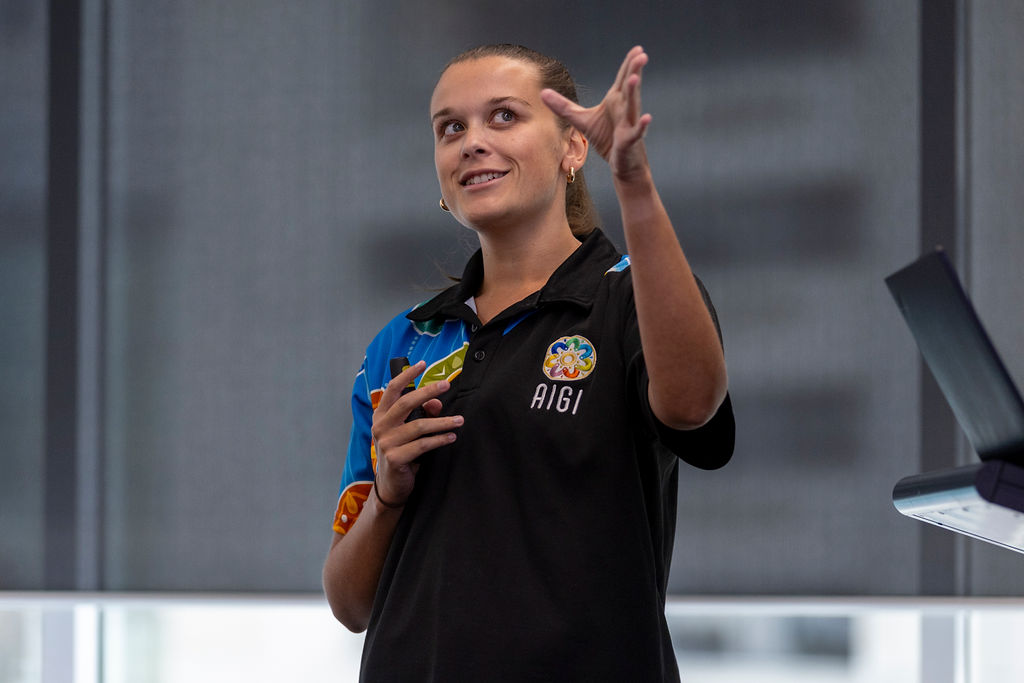
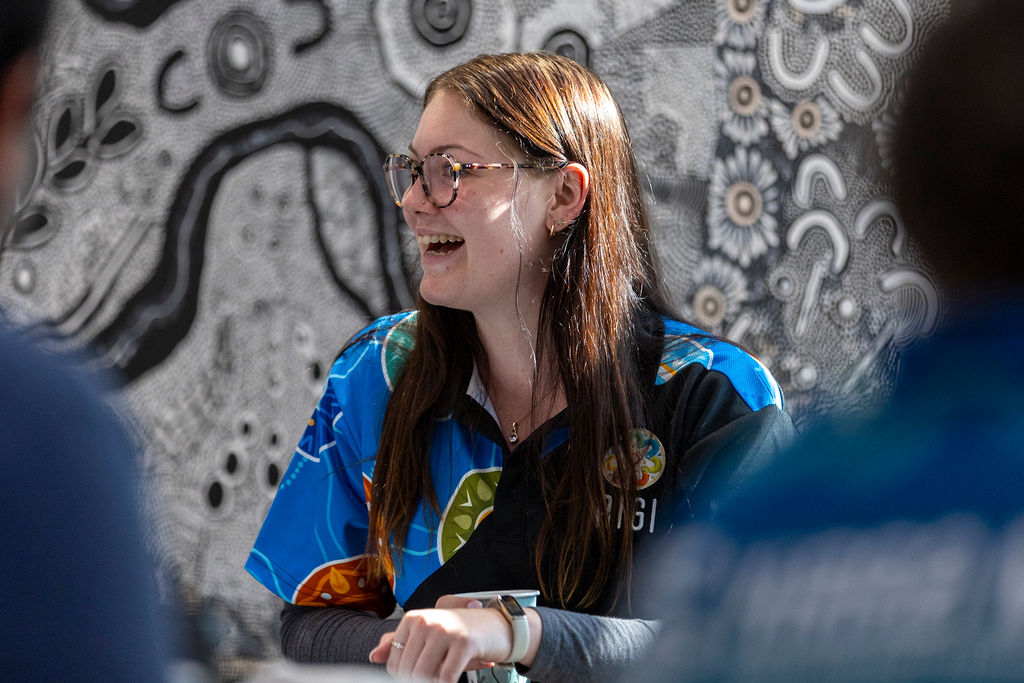
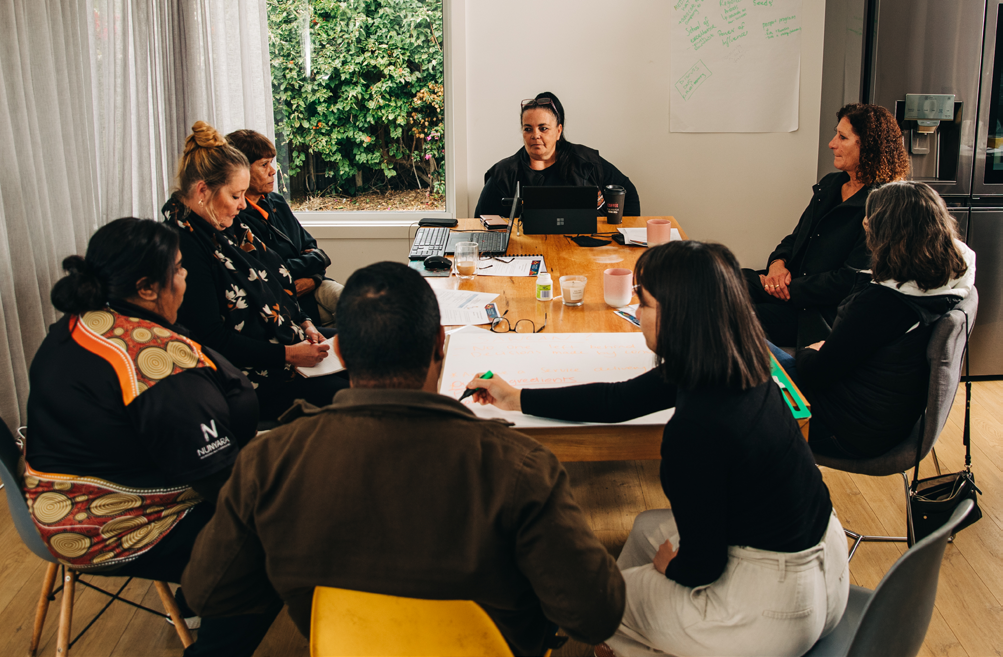
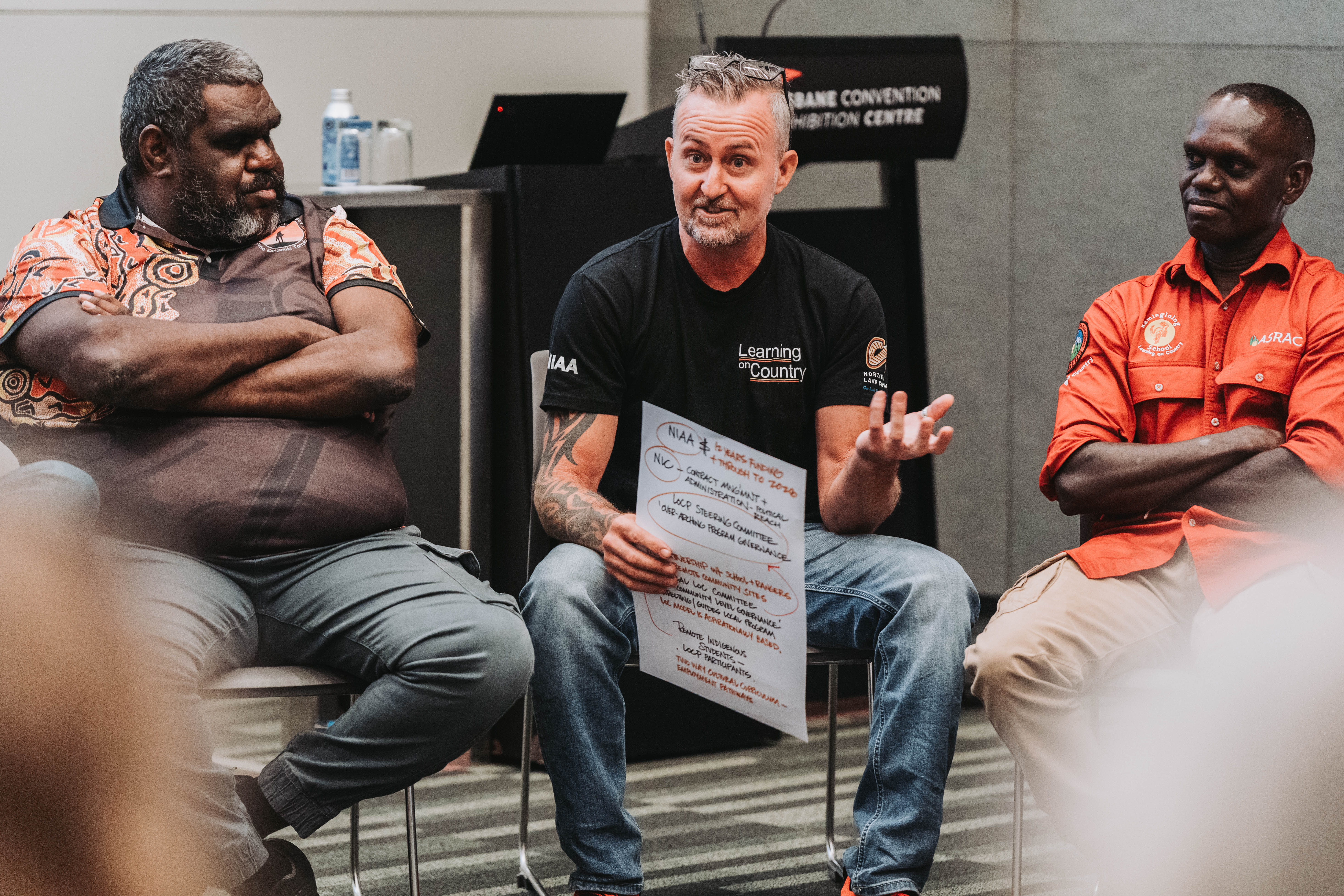
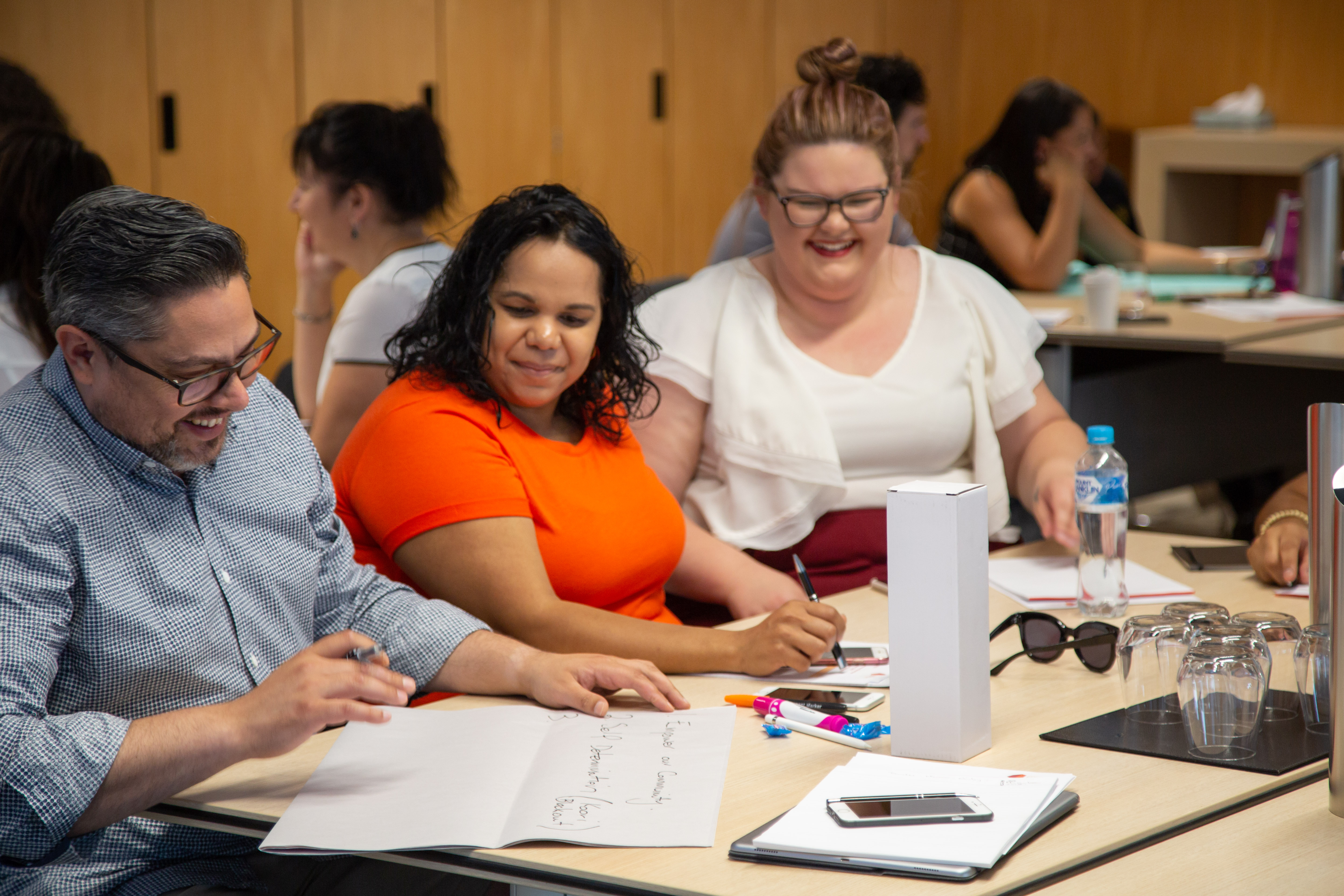

.png)




